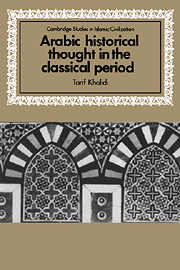4 - History and Hikma
Published online by Cambridge University Press: 23 November 2009
Summary
Hikma, meaning ‘sound judgement’ or ‘wisdom’, was a Qur'anic term destined for a long and fecund career in Arabic cultural history. For our present purposes, it suffices to remember that it was the term which the rational sciences, that is to say the sciences which did not descend directly from the Qur'an and Hadith, tended most often to adopt as the description of their subject-matter. The third/ninth century probably witnessed the appearance of the first cleavage between the revealed and the rational sciences, between Shaf' and Hikma or their numerous equivalents. Hikma grew into a tree of knowledge, shedding some branches and sprouting others over the course of centuries. Its most enduring branches, however, were made up of the natural sciences, i.e. mathematics, astronomy, alchemy and medicine, and of the philosophical sciences, i.e. logic, philosophy and dialectical theology. Under the epistemic umbrella of Hikma, the range of issues relating to historical thought reached its widest theoretical extent. Scholars and historians inspired by Hikma provide us with the most detailed answers regarding historical knowledge, what it is, how it occurs and what purposes it serves. Perhaps the best way to introduce Hikma-inspired historical writing is to examine in some detail the work of one historian, al-Mas'udi (d 345/956), whose histories reflect a broad spectrum of systematic concern with the theory and practice of history. We will then go on to discuss the origin and development of a number of theoretical questions arising from the work of al-Mas'udi. We end with a discussion of the works of some prominent historians inspired by Hikma.
- Type
- Chapter
- Information
- Arabic Historical Thought in the Classical Period , pp. 131 - 181Publisher: Cambridge University PressPrint publication year: 1994

